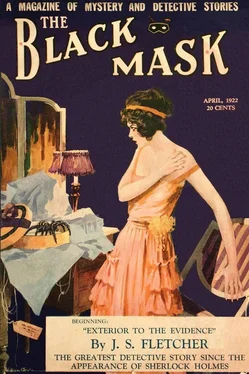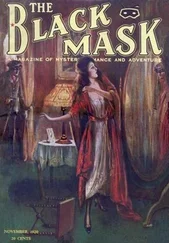J. Fletcher - The Black Mask Magazine (Vol. 5, No. 1 — April 1922)
Здесь есть возможность читать онлайн «J. Fletcher - The Black Mask Magazine (Vol. 5, No. 1 — April 1922)» весь текст электронной книги совершенно бесплатно (целиком полную версию без сокращений). В некоторых случаях можно слушать аудио, скачать через торрент в формате fb2 и присутствует краткое содержание. Город: New York, Год выпуска: 1922, Издательство: Pro-distributors Publishing Company, Жанр: Детектив, на английском языке. Описание произведения, (предисловие) а так же отзывы посетителей доступны на портале библиотеки ЛибКат.
- Название:The Black Mask Magazine (Vol. 5, No. 1 — April 1922)
- Автор:
- Издательство:Pro-distributors Publishing Company
- Жанр:
- Год:1922
- Город:New York
- ISBN:нет данных
- Рейтинг книги:3 / 5. Голосов: 1
-
Избранное:Добавить в избранное
- Отзывы:
-
Ваша оценка:
- 60
- 1
- 2
- 3
- 4
- 5
The Black Mask Magazine (Vol. 5, No. 1 — April 1922): краткое содержание, описание и аннотация
Предлагаем к чтению аннотацию, описание, краткое содержание или предисловие (зависит от того, что написал сам автор книги «The Black Mask Magazine (Vol. 5, No. 1 — April 1922)»). Если вы не нашли необходимую информацию о книге — напишите в комментариях, мы постараемся отыскать её.
The Black Mask Magazine (Vol. 5, No. 1 — April 1922) — читать онлайн бесплатно полную книгу (весь текст) целиком
Ниже представлен текст книги, разбитый по страницам. Система сохранения места последней прочитанной страницы, позволяет с удобством читать онлайн бесплатно книгу «The Black Mask Magazine (Vol. 5, No. 1 — April 1922)», без необходимости каждый раз заново искать на чём Вы остановились. Поставьте закладку, и сможете в любой момент перейти на страницу, на которой закончили чтение.
Интервал:
Закладка:
At the end of this time Harbin, the senior of the two Headquarters men, stopped in his tracks and scratched his head vigorously.
“Tom,” he ventured at last, “do you see anything wrong with these feet tracks?”
“Hell, yes,” replied Harrison. “Have you just tumbled? They show plain enough where scuffle-toes came in and went out and they show where the other fellow came out, but they don’t show this other gink coming in at all. That’s been botherin’ me for an hour.”
Harrison, who had been on the case since it was first reported, had already interviewed the members of the household but since Harbin had reported to assist him they could see nothing to do but start again from the inside.
The robbery, it was again explained to them, had occurred about one o’clock in the morning. The Garrison home was supposed to be untenanted except by the butler and two women servants who slept on the top floor, the family having been called away by the death of a relative. Their departure had been announced in the newspapers the day before. It seemed, however, that the daughter, about twenty years of age, had decided at the last moment to remain behind and was also in the house at the time of the robbery.
Schmidt, the butler, and the other servants had been with the family for years and were, by all standards, beyond suspicion. He had not heard the robbers enter but had been aroused by the noise when the strong box in Mrs. Garrison’s room — just below his — had been forced open and had dashed down, half-clad, to investigate.
In the hallway he had encountered a masked man in cap and overcoat and grappled with him. In the struggle the burglar had slipped out of the overcoat and leaped down the front stairs, firing two shots that missed but halted the servant. Schmidt had paused for slippers and then given chase by way of the front door. By the time he reached the street there was the noise of a starting motor car around the corner, hidden by the tall hedge, and he saw nothing but a blur of tail-lights.
At daybreak the police had found a revolver in the gutter three blocks down the street and an hour or so later an abandoned automobile was reported a mile away. In this was a plaid cap that the butler identified as the one worn by the burglar with whom he had struggled.
In addition to these tangible clues, the detectives had valuable evidence also in the shape of the overcoat the burglar had left in the butler’s hands. It was particularly valuable, since it bore the maker’s name. But there was something strange about all this silent evidence that had been left behind — the coat particularly.
It was an unheard-of thing for a burglar to wear to work such a fashionable and distinctive garment, so easily traced. The cap that had been found was a gaudy affair that would attract attention even in a big city. The pistol still bore its factory number. It had been scratched in an effort at effacement, but apparently the job had been given up as not worth while. As for the shoes with the cobbled soles, it seemed indeed remarkable that a crook would trust himself in a pair leaving so unmistakable an imprint wherever he walked.
With such material to work with, the detectives assigned to the job considered that they had accomplished only an average half-day’s work when they announced at noon that they had solved the mystery of the Garrison robbery.
The coat had been speedily identified. The name the purchaser had given the tailor was not known to the police but his description was and the maker had instantly recognized his Rogue’s Gallery picture. The third of the police stool-pigeons consulted gave the name of the owner of the plaid cap — a known crony of the owner of the coat, and a man who had often driven the abandoned automobile. The tracing of the revolver and the shoes would take a little time, but if they did not belong to the same, two men, the police felt certain at least that they could name two of their friends to whom they did.
The greatest mystery was why such men as these should leave such a trail. The two men positively identified were two of the best known burglars in the country but had never before been known to work in New York City. It was their home — their playground. Almost any night they could be found in Eichorn’s restaurant with their friends. In fact, Harbin had seen them there the night before.
It was incomprehensible, yet there was the evidence. And so, at noon, the police alarm went out to bring in Dave Bamfield, Red Doran, Billy Evans and Jim Anthony.
II
Harbin, more methodical than the other detectives — perhaps a trifle more intelligent — went over the evidence like a schoolmaster as four police officers sat down to lunch in Eichorn’s, where he had seen two of the wanted men the night before, apparently just before the robbery. Bamfield and Doran had been seated at the marble-topped table in the corner with June Jennings, Evans’s girl. As the detective noted that Billy Evans was missing, he recalled the gossip he had heard that the coming of the pretty blonde girl into the society of the gang was threatening to disrupt it.
His attention had been attracted to the gang by meeting, just outside, Frog Fagin, looking as though he had failed in his nightly effort to sponge a meal from the prosperous crooks and slinking away to quarters more within his measly means. Just beyond he had seen Evans hurrying toward the restaurant with determined stride and protruding jaw. He had been half tempted to wait to see a grand row over June Jennings but his bed had called loudly and he had gone home.
Now it seemed that while he slept these acquaintances of his had been, not fighting, but hard at work. The picture identified as that of the purchaser of the overcoat was that of Bamfield. The cap had been definitely placed as one used by Doran for motoring — indeed, had his initials scratched on the inside of the sweatband in small letters. Thus two of the men were fixed to a certainty. It was considered almost certain that a third man had acted as lookout and also that a fourth had remained at the wheel of the automobile. What two men would Doran and Bamfield most likely have with them on such an enterprise? They associated habitually with Anthony and Evans. The deduction seemed clear as gin and the finding was so entered and confirmed by the Old Man himself.
The capture of the four was ridiculously easy. Jim Anthony was found in what his wife violently insisted was a sick-bed and she was not a whit placated at the grinning assurance of the officers that the prison physician would give her husband the best of care, without cost. Doran was nabbed as he came to Eichorn’s for a belated breakfast. Bamfield was arrested at the hotel where he always stopped when in town, and Evans was found drunk, with a bottle beside him, in the furnished room he had lately occupied with June Jennings. The girl was nowhere to be found. Probably that was the reason for the bottle.
To say that the men denied their guilt is putting it far too mildly. They were profanely vociferous about it — almost in tears at the injustice of the accusation. A strange feature of their behavior, though, was that as they sat in the same room for a time at Headquarters, three of them each shot searching looks, as though of puzzled inquiry, at Jim Anthony. That cracksman, however, seemed to have troubles of his own. He was either a most excellent actor or really had a severe cold in the chest.
It wasn’t necessary to take their finger prints. These were already on record. To attempt a third degree with such veterans would have been a waste of time. The police listened with amused grins to the strenuous denials and calmly locked up the quartet in separate cells to await arraignment on what seemed to all a clear case.
Читать дальшеИнтервал:
Закладка:
Похожие книги на «The Black Mask Magazine (Vol. 5, No. 1 — April 1922)»
Представляем Вашему вниманию похожие книги на «The Black Mask Magazine (Vol. 5, No. 1 — April 1922)» списком для выбора. Мы отобрали схожую по названию и смыслу литературу в надежде предоставить читателям больше вариантов отыскать новые, интересные, ещё непрочитанные произведения.
Обсуждение, отзывы о книге «The Black Mask Magazine (Vol. 5, No. 1 — April 1922)» и просто собственные мнения читателей. Оставьте ваши комментарии, напишите, что Вы думаете о произведении, его смысле или главных героях. Укажите что конкретно понравилось, а что нет, и почему Вы так считаете.












